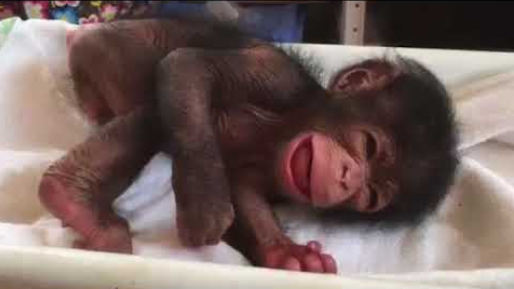In a heartbreaking discovery at a remote checkpoint near the border, authorities uncovered a horrifying scene—two baby orangutans, barely clinging to life, hidden inside a dirty plastic basket. The basket was stuffed with old clothes, sealed with tape, and shoved under sacks in the back of a transport truck. The air was hot and stale, and the cries of the babies were muffled, weak, and desperate.
Smugglers had hoped to sneak the endangered primates across the border to be sold illegally as exotic pets. At just a few months old, the babies were torn away from their mothers, who were likely killed in the process—a cruel and tragic practice far too common in illegal wildlife trade.
When the officers opened the basket, the sight was devastating. The orangutans were curled up tightly against each other, eyes wide with fear, their fur soaked in sweat and filth. One of them was barely moving, while the other whimpered softly, clutching at anything that resembled a hand or comfort. The trauma was clear. These were babies who should have been clinging to their mothers in the treetops—not trapped in plastic under the dark cover of human greed.
Rescue teams were immediately called. The orangutans were rushed to a wildlife rehabilitation center, where veterinarians worked quickly to stabilize them. Dehydrated, malnourished, and emotionally shattered, the babies were placed in incubators and fed small amounts of milk through soft bottles. Warm towels and stuffed toys were used to mimic the presence of a mother, helping to calm them.
Despite their ordeal, both babies began to show signs of recovery. One reached out to his caregiver, holding on tightly. The other, though weaker, responded to touch with a faint flicker of hope in his eyes.
These baby orangutans now have a chance at healing, love, and someday returning to the wild. Their story is a powerful reminder of the cruelty of wildlife trafficking—but also of the strength of compassion and the importance of fighting to protect those who cannot protect themselves.
